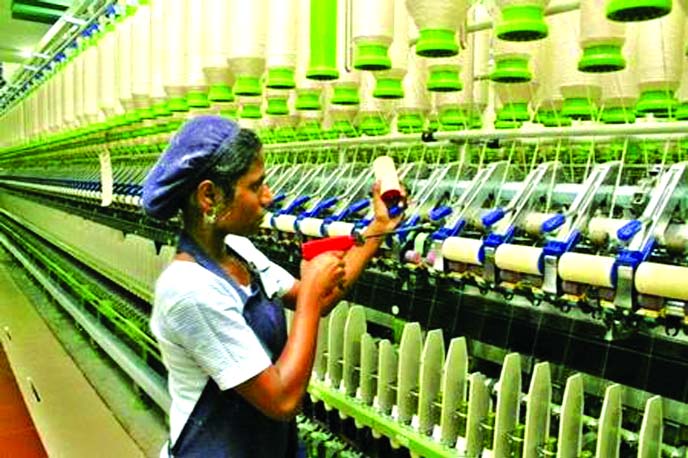
Economic reporter :
Highlighting the role of jute for economic development, state minister for textile and jute Mirza Amam on Saturday said the government has already taken steps to expand the internal market of jute along with expanding its export for increasing the jute sector’s contribution to the national economy.
“Jute sector has huge potentials for economic development. We’ve already taken steps to expand its internal market, boost export and root out corruption for increasing this sector’s contribution to the national economy,” he said while speaking at a seminar here.
“I’m hopeful that the jute sector would surpass the success of the textile sector in the next five years,” he added.
Economic Reporters Forum (ERF) organized the seminar ‘The potentials of jute sector for economic growth” with its president Saif Islam Dilal in the chair.
Bangladesh Jute Mills Corporation chairman Md Mahmudul Hasan, Jute Directorate director general Mosleh Uddin, Bangladesh Jute Diversified Product Manufacturers and Exporters Association (BDJMEA) president M Rashedul Karim Munna, Bangladesh Shippers Council chairman Rezaul Karim and ERF general secretary Ziaur Rahman, among others, spoke at the seminar.
Research director of the Centre for Policy Dialogue (CPD) Dr Khandker Golam Moazzem presented the keynote paper.
Mirza Azam said the Jatiya Sangsad passed the Jute Bill, 2017 to create scope to work in a coordinated way for the overall development of the jute sector.
The government has been extending all-out support to private sector for diversification of jute products to expand export, he said, adding that at the same time, steps have been taken to open exhibition centre at district level across the country for expanding internal market.
About the corruption in BJMC the state minister said there were no rules-policies in BJMC in the past. The present government has already taken steps to check irregularities-corruption in BJMC that has helped save losses amounting to Tk 200 crore annually, he added.
“During the regime of BNP-Jamaat there was a national and international conspiracy to destroy the jute sector. The Adamjee Jute Mills was shut down at the advice of the World Bank but at the same time, the WB gave funds for establishing nine new jute mills in India,” he added.
He said the government is thinking to organize international exhibition on jute goods to popularize the jute products.
M Rashedul Karim Munna said 28 member countries of the European Union have decided to ban the use of polythene that will create a demand for 39 billion jute bags in those countries.
Khandker Golam Moazzem in his keynote paper said there is huge demand for jute products in the domestic market and suggested building a proper marketing system. There is a demand of 292 crore gunny bags in the domestic market, he said, adding that the government needs to bring structural change in the incentives it is providing to the jute sector.
Highlighting the role of jute for economic development, state minister for textile and jute Mirza Amam on Saturday said the government has already taken steps to expand the internal market of jute along with expanding its export for increasing the jute sector’s contribution to the national economy.
“Jute sector has huge potentials for economic development. We’ve already taken steps to expand its internal market, boost export and root out corruption for increasing this sector’s contribution to the national economy,” he said while speaking at a seminar here.
“I’m hopeful that the jute sector would surpass the success of the textile sector in the next five years,” he added.
Economic Reporters Forum (ERF) organized the seminar ‘The potentials of jute sector for economic growth” with its president Saif Islam Dilal in the chair.
Bangladesh Jute Mills Corporation chairman Md Mahmudul Hasan, Jute Directorate director general Mosleh Uddin, Bangladesh Jute Diversified Product Manufacturers and Exporters Association (BDJMEA) president M Rashedul Karim Munna, Bangladesh Shippers Council chairman Rezaul Karim and ERF general secretary Ziaur Rahman, among others, spoke at the seminar.
Research director of the Centre for Policy Dialogue (CPD) Dr Khandker Golam Moazzem presented the keynote paper.
Mirza Azam said the Jatiya Sangsad passed the Jute Bill, 2017 to create scope to work in a coordinated way for the overall development of the jute sector.
The government has been extending all-out support to private sector for diversification of jute products to expand export, he said, adding that at the same time, steps have been taken to open exhibition centre at district level across the country for expanding internal market.
About the corruption in BJMC the state minister said there were no rules-policies in BJMC in the past. The present government has already taken steps to check irregularities-corruption in BJMC that has helped save losses amounting to Tk 200 crore annually, he added.
“During the regime of BNP-Jamaat there was a national and international conspiracy to destroy the jute sector. The Adamjee Jute Mills was shut down at the advice of the World Bank but at the same time, the WB gave funds for establishing nine new jute mills in India,” he added.
He said the government is thinking to organize international exhibition on jute goods to popularize the jute products.
M Rashedul Karim Munna said 28 member countries of the European Union have decided to ban the use of polythene that will create a demand for 39 billion jute bags in those countries.
Khandker Golam Moazzem in his keynote paper said there is huge demand for jute products in the domestic market and suggested building a proper marketing system. There is a demand of 292 crore gunny bags in the domestic market, he said, adding that the government needs to bring structural change in the incentives it is providing to the jute sector.

